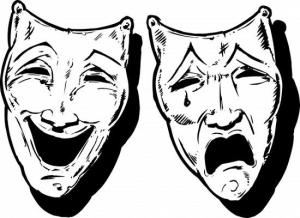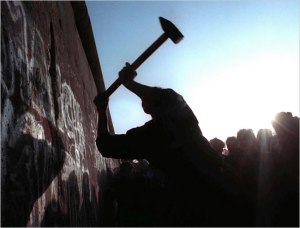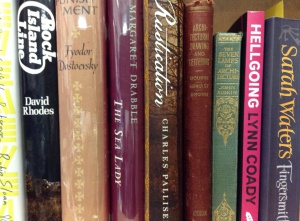An Artistic Statement … sort of
It’s probably safe to say that anyone who writes literary fiction and had their work published, or shared it with others, has at one time or another been faced with these or similar questions:
• Why are your stories so depressing?
• Why does nothing good ever happen to your characters?
• Why can’t you write a happy story?
All of which are legitimate and reasonable questions to ask. Often, when I’m considering story ideas, I wonder what draws me to dark and painful subject matter. It could be that I’m attracted to characters approaching a crossroads or facing a moral quandary. Their lives already have or are about to change, and not necessarily for the better. There is a looming threat of some kind, or they make a poor decision, or they are simply unlucky, and they spend the rest of the story digging themselves out of a situation that could have disastrous or even deadly consequences. Sometimes they make it. Occasionally they don’t.
This is nothing new. Much of our literature tells stories of suffering and endurance. It seems unavoidable. We are captivated by tragedy, by stories in which a character’s striving comes to nothing, by stories that depict the worst that human nature has to offer, by stories in which honest and decent people through no fault of their own must struggle against adversity. Look at any literary prize shortlist. Maybe we don’t think of it in these terms, but it’s worth asking why grim or shocking or disturbing fiction is valued so highly. Or, to turn the question around, we could ask why fiction that is lighthearted or comforting or written with no purpose other than to entertain is considered inferior to so-called “serious” fiction and swiftly dismissed.
This gets somewhere close to the point. Whether reading or writing, what I’m looking for is a story that is dramatically compelling. When I write, I want the story I’m working on to hold the reader’s attention, and to do that it first has to hold my attention. So if my fiction is depressing, if none of my characters ever have anything good happen to them, if none of my stories are happy stories, it comes down to what I find interesting as a reader, which are the same things I find interesting as a writer. Obviously the fault here is mine and nobody else’s (including the university professors who put all those depressing plays and novels on their reading lists).
What does this mean? In practical terms it means that any story I willingly spend time and energy on will include a character the reader cares about suffering some kind of setback. This does not necessarily mean physical suffering. It can also mean the character discovers his goal is harder to reach than he’d expected, or he is forced by circumstance to make a difficult decision or recognize a painful truth or commit an act that has morally questionable or hurtful consequences. In order to be meaningful, however, the reader must care what happens. As a writer, the response I want is visceral. The character’s struggle has no meaning if the reader doesn’t care. The character’s fate has to matter.
This is, of course, a principle that goes back to ancient times.
I once criticized a book for having a soft ending that is “content to provide everyone with exactly what his or her heart desires.” Some might ask, what’s wrong with that? The only justification I can offer is to say that the most satisfying art is art that imitates life, and in the 21st century we know that it’s rare for anyone to get exactly what their heart desires. My feeling was that the author had let the characters off easy and left several dramatic possibilities unexplored. 200 years ago Jane Austen could close her novels with happy marriages because aesthetic tastes and reader expectations were different (and we still read her because her exceptional genius allowed her to avoid sentiment). But a succession of traumatic events including two world wars have altered the world we live in, and these days happy endings in fiction carry a whiff of wish fulfillment and in literary terms are unconvincing.
Still, there’s no formula for writing good fiction. The writer’s relationship with the blank page is exclusive and personal. There’s no room for anyone else. I don’t write fiction to confirm things I already know or to give people an excuse to feel good about themselves. I write to understand what it means to be human. And if nothing else, events from the recent and distant past have taught that the experience of being human exposes us to beauty and ugliness in equal measure.
In a letter to his friend Oskar Pollak, Franz Kafka wrote that the books we read should “bite and sting us.” “A book,” he says, “must be the axe for the frozen sea inside us.” In other words, a book should shock us into new ways of thinking and change the way we see the world. The prose, the ideas, the twists in plot: these should take our breath away and make us grateful that of all the books out there, this book has found its way into our hands. A book should carry the justification for its existence on every page. And it doesn’t have to be pretty to do this.
Ultimately, though, the author’s commitment to the reader is to write a story that is so fascinating and beguiling the reader has no choice but to keep turning the pages. Even at their most gruesome and pessimistic, Kafka’s stories honour this commitment. Ninety years after his death readers all over the world continue to be mesmerized by the works of an obscure Czech insurance adjuster. And no one ever read Kafka for the happy endings.
So when people ask me these questions:
• Why are your stories so depressing?
• Why does nothing good ever happen to your characters?
• Why can’t you write a happy story?
my answer—that I write fiction I would want to read myself, that I’m searching for a new angle on the human condition, that the struggles I envision for my characters are ones I find dramatically interesting—may be a simplification but it at least gets us somewhere near the truth. Anyone looking for a happy story won’t be picking up one of my books anytime soon. But I can live with that, not that I have any choice.





 Foreboding hangs heavily over the action of Canada, Richard Ford’s 2012 novel. This is the story of Dell Parsons, who in 1960 is fifteen and growing up with his mother and father and twin sister Berner in Great Falls, Montana when the family unit is blown apart in the wake of an ill-conceived bank robbery committed by their parents. After their parents are arrested the resentful Berner walks away, apparently to forge a life elsewhere. Dell waits and is eventually rescued by a friend of his mother, who had agreed to take both children to Canada to live with her brother in rural Saskatchewan, a place that Ford depicts as bleak and harrowing and smouldering with repressed violence. Dell spends his time in Saskatchewan observing the strange people around him, keeping his emotions in check and committing himself to nothing, all the while trying to reinvent himself. It turns out that the man into whose care he has been delivered, Arthur Remlinger, has spent years doing the same thing: struggling to emerge from the shadow of an act of violence committed by the passionate and idealistic youth he used to be. Ford’s vision is fatalistic, and much of the novel explores how past acts contribute to the person we become in the present, the impossibility of denying these acts, the inescapable consequences and the need for acceptance. It is also a novel about crossing borders, physical and moral. The narrative, first person from Dell’s perspective, is dark and taut and teeming with untrustworthy characters all keeping an eye on each other. The brief final section shows us Dell and Berner reunited fifty years after the main action, each sibling having responded in his and her own way to their parents’ fateful decision. Canada is a wise and profound work of fiction that you will not soon forget.
Foreboding hangs heavily over the action of Canada, Richard Ford’s 2012 novel. This is the story of Dell Parsons, who in 1960 is fifteen and growing up with his mother and father and twin sister Berner in Great Falls, Montana when the family unit is blown apart in the wake of an ill-conceived bank robbery committed by their parents. After their parents are arrested the resentful Berner walks away, apparently to forge a life elsewhere. Dell waits and is eventually rescued by a friend of his mother, who had agreed to take both children to Canada to live with her brother in rural Saskatchewan, a place that Ford depicts as bleak and harrowing and smouldering with repressed violence. Dell spends his time in Saskatchewan observing the strange people around him, keeping his emotions in check and committing himself to nothing, all the while trying to reinvent himself. It turns out that the man into whose care he has been delivered, Arthur Remlinger, has spent years doing the same thing: struggling to emerge from the shadow of an act of violence committed by the passionate and idealistic youth he used to be. Ford’s vision is fatalistic, and much of the novel explores how past acts contribute to the person we become in the present, the impossibility of denying these acts, the inescapable consequences and the need for acceptance. It is also a novel about crossing borders, physical and moral. The narrative, first person from Dell’s perspective, is dark and taut and teeming with untrustworthy characters all keeping an eye on each other. The brief final section shows us Dell and Berner reunited fifty years after the main action, each sibling having responded in his and her own way to their parents’ fateful decision. Canada is a wise and profound work of fiction that you will not soon forget.  Elizabeth Gilbert’s story follows Alma Whittaker from her birth in 1800 into her old age. Alma is the daughter of Henry Whittaker, who from humble beginnings in 18th-century London builds a vast corporate empire stretching across several continents. Henry is a pragmatist who has no use for superstition or religion and nothing but scorn for established and polite ways of conducting business. An expert amateur botanist, he has a scientist’s fascination for living things and is knowledgeable of habitat and what it takes to make plants grow and thrive. However, coming from a hardscrabble upbringing and having endured for years the contempt of his “betters,” his primary interest is making money, and this is an activity at which he excels. Alma, born into comfort and knowing nothing else, gains her maturity at the enlightened Whittaker estate, where curiosity and skepticism are encouraged, surrounded by the stimulating influence of the books her father has collected and the almost nightly company of intelligent and inquisitive dinner guests. Alma shares her father’s fascination for the natural world, but with her keen intellect, the luxury of leisure time and a single-minded devotion to her quest for knowledge, she transforms amateur curiosity into scholarly ambition. Alma’s life unfolds against a backdrop of continuous scientific discovery, religious upheaval, and the occasional war, a time when ancient and sacred assumptions were being debunked on an almost daily basis. But apart from the historical details Gilbert devotes just as much if not more space to Alma’s personal discoveries, and this is what gives the novel its soul. In this engrossing story of a deeply intellectual woman alive at a time when women were expected to keep to the shadows and speak in undertones, we see Alma Whittaker at her best and also at her very worst. Alma is, above all else a seeker of answers who will let nothing interrupt her quest. To be sure she makes bad decisions and repeatedly displays poor judgment (especially in matters of the heart), but this only makes her a more endearing character and her story all the more poignant. What greater compliment is there than to say that though this is a long book I didn’t want it to end? The Signature of all Things engages on multiple levels and is a richly satisfying reading experience.
Elizabeth Gilbert’s story follows Alma Whittaker from her birth in 1800 into her old age. Alma is the daughter of Henry Whittaker, who from humble beginnings in 18th-century London builds a vast corporate empire stretching across several continents. Henry is a pragmatist who has no use for superstition or religion and nothing but scorn for established and polite ways of conducting business. An expert amateur botanist, he has a scientist’s fascination for living things and is knowledgeable of habitat and what it takes to make plants grow and thrive. However, coming from a hardscrabble upbringing and having endured for years the contempt of his “betters,” his primary interest is making money, and this is an activity at which he excels. Alma, born into comfort and knowing nothing else, gains her maturity at the enlightened Whittaker estate, where curiosity and skepticism are encouraged, surrounded by the stimulating influence of the books her father has collected and the almost nightly company of intelligent and inquisitive dinner guests. Alma shares her father’s fascination for the natural world, but with her keen intellect, the luxury of leisure time and a single-minded devotion to her quest for knowledge, she transforms amateur curiosity into scholarly ambition. Alma’s life unfolds against a backdrop of continuous scientific discovery, religious upheaval, and the occasional war, a time when ancient and sacred assumptions were being debunked on an almost daily basis. But apart from the historical details Gilbert devotes just as much if not more space to Alma’s personal discoveries, and this is what gives the novel its soul. In this engrossing story of a deeply intellectual woman alive at a time when women were expected to keep to the shadows and speak in undertones, we see Alma Whittaker at her best and also at her very worst. Alma is, above all else a seeker of answers who will let nothing interrupt her quest. To be sure she makes bad decisions and repeatedly displays poor judgment (especially in matters of the heart), but this only makes her a more endearing character and her story all the more poignant. What greater compliment is there than to say that though this is a long book I didn’t want it to end? The Signature of all Things engages on multiple levels and is a richly satisfying reading experience.  Colony, Hugo Wilcken’s second novel—published to scant publicity and little fanfare in 2007—is a gripping and suspenseful book that can perhaps be described as a close examination of the fluid nature of human identity. It is 1928 and Sabir, a French veteran of the Great War, is being shipped out to a penal colony in French Guiana. Sabir is naïve but also smart enough to know that his survival depends less on who he is than on who he can become once he reaches his destination. Once in the colony he is able to adapt quickly as circumstances change, and with lies and cunning secures a cushy position as gardener, working for the camp commandant. In the first part of the novel suspense builds as we approach Sabir’s escape attempt with several partners, one of whom—the enigmatic Edouard—is an acquaintance from Sabir’s time in the trenches. In the novel’s second part another French veteran, Manne, arrives in the colony on a mission to find his friend: the same Edouard. But Manne’s origins are as obscure as his intentions—he is already traveling under an assumed identity using forged papers and a bogus story to justify his presence in the colony—and he foolishly risks everything by forming an ill-considered alliance with the commandant’s beautiful but unreliable wife, agreeing to help her escape. This is a story that, scene by scene, conceals as much as it reveals, and by doing so suggests that trust between individuals is virtually impossible because in our heart we are all hiding the person we really are. Wilcken’s spare and coolly efficient prose is filled with jaundiced observations on human behaviour and displays true power in its terse evocation of lives being lived at the point where the struggle for survival intersects with the pursuit of something more. Readers will find themselves turning the pages to discover what happens, but also wishing to delay reaching the end because the reading is so pleasurable. It’s an exquisite dilemma.
Colony, Hugo Wilcken’s second novel—published to scant publicity and little fanfare in 2007—is a gripping and suspenseful book that can perhaps be described as a close examination of the fluid nature of human identity. It is 1928 and Sabir, a French veteran of the Great War, is being shipped out to a penal colony in French Guiana. Sabir is naïve but also smart enough to know that his survival depends less on who he is than on who he can become once he reaches his destination. Once in the colony he is able to adapt quickly as circumstances change, and with lies and cunning secures a cushy position as gardener, working for the camp commandant. In the first part of the novel suspense builds as we approach Sabir’s escape attempt with several partners, one of whom—the enigmatic Edouard—is an acquaintance from Sabir’s time in the trenches. In the novel’s second part another French veteran, Manne, arrives in the colony on a mission to find his friend: the same Edouard. But Manne’s origins are as obscure as his intentions—he is already traveling under an assumed identity using forged papers and a bogus story to justify his presence in the colony—and he foolishly risks everything by forming an ill-considered alliance with the commandant’s beautiful but unreliable wife, agreeing to help her escape. This is a story that, scene by scene, conceals as much as it reveals, and by doing so suggests that trust between individuals is virtually impossible because in our heart we are all hiding the person we really are. Wilcken’s spare and coolly efficient prose is filled with jaundiced observations on human behaviour and displays true power in its terse evocation of lives being lived at the point where the struggle for survival intersects with the pursuit of something more. Readers will find themselves turning the pages to discover what happens, but also wishing to delay reaching the end because the reading is so pleasurable. It’s an exquisite dilemma.  In Nickel Mountain, published in 1973, John Gardner’s genius is on full display. This is the story of Henry Soames, who runs the Stop-Off, a diner situated along a highway in the mountainous Catskills in southeastern New York State. Henry—obese, timid, thoughtful, unambitious—waits for whatever life brings his way, much as he waits for customers to darken the door of the Stop-Off. Grossly overweight (a trait inherited from his father) and with a bad heart, he is living on borrowed time and knows it, but is content to let things continue as they are because he is simply unable to envision his life differently. When a neighbour asks if Henry will let his daughter work at the diner, though he fears and resents changes to his routine, he relents rather than annoy the man. Thus teenage Callie Wells enters Henry’s life, and though neither of them have any reason to think this is anything but temporary, she stays. Henry’s passive and accepting approach to being alive means that he is little more than a spectator to his own fate, and yet we come to care deeply for him. Callie is a wisp of a girl who speaks her mind, makes mistakes and often acts rashly and ill-advisedly, and yet we grieve for her when her lover takes off and she is forced to a decision that changes her life. Gardner populates the community around the diner with a clutch of grotesques, misfits and eccentrics who—be they narrow-minded, pigheaded, brain-addled, misanthropic or some combination—are always interesting. The action and setting are vividly rendered. The natural world, especially the forest, with its suggestion of things beyond our knowing and its threat of chaos, is a pervasive if murky and mysterious presence that informs the narrative at all levels. Remarkable for these reasons and more, Nickel Mountain demonstrates that even for someone like Henry Soames, life is an adventure that can lead anywhere. This is a major novel by one of America’s best writers.
In Nickel Mountain, published in 1973, John Gardner’s genius is on full display. This is the story of Henry Soames, who runs the Stop-Off, a diner situated along a highway in the mountainous Catskills in southeastern New York State. Henry—obese, timid, thoughtful, unambitious—waits for whatever life brings his way, much as he waits for customers to darken the door of the Stop-Off. Grossly overweight (a trait inherited from his father) and with a bad heart, he is living on borrowed time and knows it, but is content to let things continue as they are because he is simply unable to envision his life differently. When a neighbour asks if Henry will let his daughter work at the diner, though he fears and resents changes to his routine, he relents rather than annoy the man. Thus teenage Callie Wells enters Henry’s life, and though neither of them have any reason to think this is anything but temporary, she stays. Henry’s passive and accepting approach to being alive means that he is little more than a spectator to his own fate, and yet we come to care deeply for him. Callie is a wisp of a girl who speaks her mind, makes mistakes and often acts rashly and ill-advisedly, and yet we grieve for her when her lover takes off and she is forced to a decision that changes her life. Gardner populates the community around the diner with a clutch of grotesques, misfits and eccentrics who—be they narrow-minded, pigheaded, brain-addled, misanthropic or some combination—are always interesting. The action and setting are vividly rendered. The natural world, especially the forest, with its suggestion of things beyond our knowing and its threat of chaos, is a pervasive if murky and mysterious presence that informs the narrative at all levels. Remarkable for these reasons and more, Nickel Mountain demonstrates that even for someone like Henry Soames, life is an adventure that can lead anywhere. This is a major novel by one of America’s best writers.  Anyone who writes short stories knows how difficult it is to get their characters talking and stitch scenes together and provide just enough backstory and create a complete drama in 20 pages, more or less. The trick is making it seem easy. In Hellgoing Lynn Coady makes it seem easy. These are nine entertaining, thought-provoking stories drawn from life in the here and now, narrated with energy, verve and irreverent humour. Coady’s characters are insecure and questioning their place in the world, concerned that they are not living up to expectations and terrified that they will fail in a way that exposes them to the contempt and ridicule of colleagues, friends or family. Their actions are often guided by an instinct for self-preservation or a desire to make things right or to protect themselves from embarrassment. In “Wireless” alcoholic Jane, travelling alone on business in Newfoundland, cuts short a booze-inspired relationship with Ned when she realizes she’s being manipulated. In “Dogs in Clothes” Sam, a young publishers’ rep charged with accompanying author Marco through a whirlwind series of interviews and public appearances, emboldened by alcohol finally cracks and tells him off for being a rude and insensitive jackass. And in “Mr. Hope,” Shelly’s relationship with her teacher evolves over time to become something mysterious yet oddly comforting that she realizes she will probably never understand. Coady’s full-throttle approach almost makes it seem like the stories are slapped together, but if you slow down you will see how much care has been taken not just in the writing but also in the editing. These are stories as remarkable for what’s in them as for what’s left out. Some reviewers have remarked on the lack of resolution, but that’s a matter of taste. For those who enjoy the open-endedness of art that imitates life, Hellgoing is a treat..
Anyone who writes short stories knows how difficult it is to get their characters talking and stitch scenes together and provide just enough backstory and create a complete drama in 20 pages, more or less. The trick is making it seem easy. In Hellgoing Lynn Coady makes it seem easy. These are nine entertaining, thought-provoking stories drawn from life in the here and now, narrated with energy, verve and irreverent humour. Coady’s characters are insecure and questioning their place in the world, concerned that they are not living up to expectations and terrified that they will fail in a way that exposes them to the contempt and ridicule of colleagues, friends or family. Their actions are often guided by an instinct for self-preservation or a desire to make things right or to protect themselves from embarrassment. In “Wireless” alcoholic Jane, travelling alone on business in Newfoundland, cuts short a booze-inspired relationship with Ned when she realizes she’s being manipulated. In “Dogs in Clothes” Sam, a young publishers’ rep charged with accompanying author Marco through a whirlwind series of interviews and public appearances, emboldened by alcohol finally cracks and tells him off for being a rude and insensitive jackass. And in “Mr. Hope,” Shelly’s relationship with her teacher evolves over time to become something mysterious yet oddly comforting that she realizes she will probably never understand. Coady’s full-throttle approach almost makes it seem like the stories are slapped together, but if you slow down you will see how much care has been taken not just in the writing but also in the editing. These are stories as remarkable for what’s in them as for what’s left out. Some reviewers have remarked on the lack of resolution, but that’s a matter of taste. For those who enjoy the open-endedness of art that imitates life, Hellgoing is a treat..  Following the death of his wife and daughter Alexander Fox moves to Andorra to start his life anew. He quickly falls under the spell of this tiny isolated country that moves at its own pace, its ancient stone buildings and people who come from everywhere and nowhere. In Andorra’s capital, La Plata, he meets an Australian couple, Mr. and Mrs. Dent, who have moved to this strange place seeking a fresh start for reasons of their own. He also becomes involved with the Quays, a family of aristocrats, well established on La Plata’s outskirts on their luxurious estate. But as Fox builds new relationships his old life comes back to haunt him, and he begins to understand how difficult it is to re-invent oneself and leave the past behind. Andorra is a mesmerizing and seductive novel. Peter Cameron’s prose is a delight to read, memorable and evocative and gently rhythmic. The story unfolds slowly—building mystery and suspense but so subtly that you hardly notice how gripping it is. If you prefer fiction with all the questions answered and everything tied up in a neat little package, then maybe Andorra is not for you, but if you don’t read this book you’re missing a brilliant work by a master novelist.
Following the death of his wife and daughter Alexander Fox moves to Andorra to start his life anew. He quickly falls under the spell of this tiny isolated country that moves at its own pace, its ancient stone buildings and people who come from everywhere and nowhere. In Andorra’s capital, La Plata, he meets an Australian couple, Mr. and Mrs. Dent, who have moved to this strange place seeking a fresh start for reasons of their own. He also becomes involved with the Quays, a family of aristocrats, well established on La Plata’s outskirts on their luxurious estate. But as Fox builds new relationships his old life comes back to haunt him, and he begins to understand how difficult it is to re-invent oneself and leave the past behind. Andorra is a mesmerizing and seductive novel. Peter Cameron’s prose is a delight to read, memorable and evocative and gently rhythmic. The story unfolds slowly—building mystery and suspense but so subtly that you hardly notice how gripping it is. If you prefer fiction with all the questions answered and everything tied up in a neat little package, then maybe Andorra is not for you, but if you don’t read this book you’re missing a brilliant work by a master novelist.